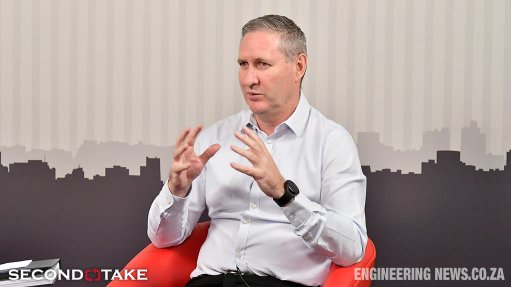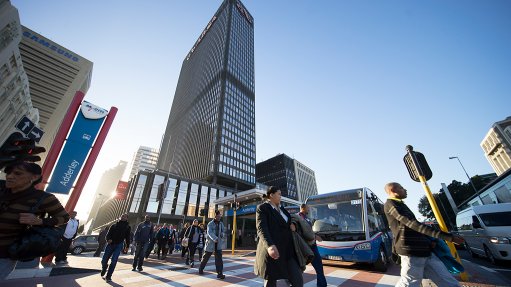Biting the bullet key to overcoming power crisis
This article has been supplied as a media statement and is not written by Creamer Media. It may be available only for a limited time on this website.
Company Announcement -There are no short-term solutions to South Africa’s current power crisis – the solution lies in a combination of strategy, demand-side interventions and an effective maintenance programme, say members of the POWER-GEN and DistribuTECH Africa Advisory Board. Bertha Dlamini, a POWER-GEN Africa Advisory Board member and Managing Director of EON Consulting, points out that the situation in South Africa is uniquely complex: “As a country, we have plans to move away from our dependence on coal, but we concurrently need to be clear on how we manage the risks to communities and the environment of alternative energy sources such as nuclear. So we have an ageing infrastructure, generation capacity that is battling to meet rapidly increasing demand from commercial and residential customers. In addition, there are trade agreements that must be met to neighbouring states. This compounds the demand on our current generation capacity. In addition; major power users have been slow to embrace energy efficiency programmes; infrastructure vandalism and energy theft are a growing problem.
Eskom is in a volatile position, and turning this situation around in a short space of time will prove very difficult.” Nuclear energy, which could prove a relatively quick fix to the crisis, is not without its risks, she points out. “Nuclear has worked very well in countries like China. And while it is included in South Africa’s medium-term power plans, the implementation requires financial investment and commitment. The issue of radioactive waste is a major one, and its potential impact on communities and the environment must be carefully considered,” she says. Base infrastructure rejuvenation is also crucial in closing the growing gap between supply and demand, she says. “The country’s power infrastructure must be maintained at right level and right frequency to get optimal value out of it. Unfortunately, our demand is growing at a rapid rate due to increased demand for access and maturing industries, but our generation base hasn’t increased at the same rate.” This problem is compounded by the fact that many enterprises have made minimal moves to increase their energy efficiency.
The legislative environment plays a role too, says Dlamini. She points out that the process for independent service providers to participate in the South African power ecosystem is a complex and expensive one, with the result that mainly internationally-funded and large scale projects are being implemented. However, opening the space to allow smaller players and all tiers of local government to generate renewable alternative energy could go some way to reducing the pressure on the grid.
Crime also needs to be addressed more effectively, she says. “Infrastructure vandalism and energy theft are becoming a serious problem. The revenue lost due to illegal connections is quite significant. And the theft of copper cables, which spikes as the copper price increases, also adds significantly to the pressure on our generation capacity.” Kribs Govender, POWER-GEN Africa Advisory Board member and Vice President: Business Development, Power & Gas at Sasol, says efforts to bring new capacity online may start bearing fruit in the next few years, but in the interim, the power problem will continue. “In the immediate term, we are limited from a supply perspective, so we need to take further demand side interventions,” he says. He says demand side management has improved since the power crisis that emerged in 2008, therefore the ‘big ticket items’ in terms of demand have already been addressed. Smaller, incremental changes will also make a difference, says Govender. Innovative action by municipalities, such as projects to harness gas from waste dumps, could also help to reduce demand, he says. However, piecemeal solutions such as these still face the challenge of connecting to the grid.
“We will be in a constrained situation for the next two to three years, but an effective Eskom maintenance plan would also improve the situation,” he says. Gordon Blackwood, General Sales Manager at Doosan Power Systems and POWER-GEN Africa Advisory Board member, shares this view. “A bitter pill needs to be swallowed now,” he says. “The ‘patch approach’ to maintenance is not sustainable, and the only way to stabilize the power supply is to properly repair and replace Eskom’s ageing units.” He points out that the Medupi and Kusile power stations coming online would significantly improve supply, but only if the current power stations remain fully functional too. “Without proper maintenance and repair, there is a very good chance that existing infrastructure would fail before the additional power stations are fully functional,” he says. Eskom needs to go back to basics. Assessments must be carried out unit by unit to determine what is required to get them back to reliable operating condition, then all the necessary components and resources must be sourced and scheduled outages must take place to replace ageing units. Components cannot simply be patched. If there is a problem with a superheater, for example, you need to replace the whole thing.”
Blackwood says: “It won’t be easy going forward. You have to invest time, money and effort to get all the units back to reliable working condition, and then keep them in that state through regular maintenance and condition assessments. Eskom may have managed to keep the lights on through patch maintenance in recent years, but they cannot overload these units forever.”
The 3rd POWER-GEN Africa and DistribuTECH Africa, organised by PennWell Corporation will provide comprehensive coverage of the power needs, resources and issues facing the electricity generation industries across sub-Saharan Africa. POWER-GEN Africa focusing on all aspects of the conventional and renewable power generation industry and DistribuTECH Africa focusing on transmission and distribution sectors within sub-Saharan Africa, the events will brings together the world’s leading power equipment suppliers along with companies developing power infrastructure in Africa. For more information and to register for the Early Bird Discount by 17 June 2015, go to www.powergenafrica.com and www.distributechafrica.com
Comments
Press Office
Announcements
What's On
Subscribe to improve your user experience...
Option 1 (equivalent of R125 a month):
Receive a weekly copy of Creamer Media's Engineering News & Mining Weekly magazine
(print copy for those in South Africa and e-magazine for those outside of South Africa)
Receive daily email newsletters
Access to full search results
Access archive of magazine back copies
Access to Projects in Progress
Access to ONE Research Report of your choice in PDF format
Option 2 (equivalent of R375 a month):
All benefits from Option 1
PLUS
Access to Creamer Media's Research Channel Africa for ALL Research Reports, in PDF format, on various industrial and mining sectors
including Electricity; Water; Energy Transition; Hydrogen; Roads, Rail and Ports; Coal; Gold; Platinum; Battery Metals; etc.
Already a subscriber?
Forgotten your password?
Receive weekly copy of Creamer Media's Engineering News & Mining Weekly magazine (print copy for those in South Africa and e-magazine for those outside of South Africa)
➕
Recieve daily email newsletters
➕
Access to full search results
➕
Access archive of magazine back copies
➕
Access to Projects in Progress
➕
Access to ONE Research Report of your choice in PDF format
RESEARCH CHANNEL AFRICA
R4500 (equivalent of R375 a month)
SUBSCRIBEAll benefits from Option 1
➕
Access to Creamer Media's Research Channel Africa for ALL Research Reports on various industrial and mining sectors, in PDF format, including on:
Electricity
➕
Water
➕
Energy Transition
➕
Hydrogen
➕
Roads, Rail and Ports
➕
Coal
➕
Gold
➕
Platinum
➕
Battery Metals
➕
etc.
Receive all benefits from Option 1 or Option 2 delivered to numerous people at your company
➕
Multiple User names and Passwords for simultaneous log-ins
➕
Intranet integration access to all in your organisation

















